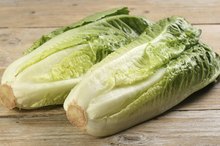Are Radishes Good for High Blood Sugar?
There is some preliminary evidence that specific parts of the radish may help lower blood sugar, but it will take much more research before nutritionists can confidently claim it will work for you. Consult your doctor about your diet for managing high blood sugar.
What Causes High Blood Sugar
High blood sugar most often occurs when your body either does not make enough insulin or cannot properly use the insulin it does make; it is commonly associated with diabetes. Carb-containing foods, such as grains, fruit or milk, have the greatest impact on blood sugar, and eating too many at one time may cause blood sugar levels to rise.
Radish Nutrition
How Many Calories are in Carrot Soup?
Learn More
Radishes are not a high-carb food. In fact, they are very low in both carbs and calories. A 1-cup serving of sliced raw radishes contains 19 calories, 4 grams of carbs, 2 grams of fiber and 1 gram of protein. Radishes are also rich in vitamins and minerals, with 29 milligrams of calcium, 270 milligrams of potassium, 17 milligrams of vitamin C and 29 milligrams of folate per 1-cup serving.
Radishes and High Blood Sugar
As a low-carb food, radishes should not have much of an impact on your blood sugar unless you eat large quantities. A 2007 study published in the Journal of Nutritional Science and Vitaminology reports that Japanese radish sprouts, also referred to as daikon, lowered blood sugar levels in diabetic rats. While there is some evidence that radish sprouts may help with high blood sugar, clinical trials are necessary before claims and recommendations can be made.
Radishes and Your Healthy Diet Plan
Nutrition Facts of Doenjang Jjigae
Learn More
When it comes to managing your blood sugar, radishes make a healthy addition to your diet plan. And as a cruciferous vegetable, radishes also may help lower your risk of certain types of cancer such as lung or colon cancer, according to the Linus Pauling Institute. Add sliced radishes to your salad greens for some crunch, or saute, steam or boil them for a tasty low-calorie, low-carb vegetable side dish.
Related Articles
References
- Linus Pauling Institute: All About Radishes
- Journal of Nutritional Science and Vitaminology: Differing Effects of Water-Soluble and Fat-Soluble Extracts From Japanese Radish (Raphanus Sativus) Sprouts on Carbohydrate and Lipid Metabolism in Normal and Streptozotocin-Induced Diabetic Rats
- MedlinePlus: High Blood Sugar
- USDA Natural Resources Conservation Service: Plant Fact Sheet: Oilseed Radish
Writer Bio
Jill Corleone is a registered dietitian and health coach who has been writing and lecturing on diet and health for more than 15 years. Her work has been featured on the Huffington Post, Diabetes Self-Management and in the book "Noninvasive Mechanical Ventilation," edited by John R. Bach, M.D. Corleone holds a Bachelor of Science in nutrition.









